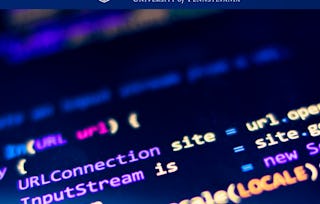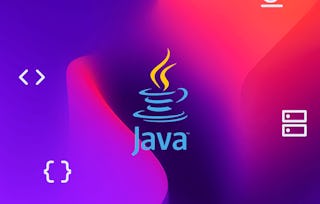If you want to get started in the world of software development, this course will help you take the first steps. You will learn to make your first programs using one of the most popular languages, in force for years and with great demand in the market: Java. The course will present you with a brief introduction to object-oriented programming that will help you delve deeper into the topic later. You will learn how to code Java and how to use one of the most popular development environments, Eclipse. The course will guide you so that, with both tools, you can begin to think about how to solve problems using Java programs.

Introduction to Java

Recommended experience
What you'll learn
How to code Java.
How to use one of the most popular development environments (Eclipse).
Skills you'll gain
Details to know

Add to your LinkedIn profile
14 assignments
See how employees at top companies are mastering in-demand skills

There are 4 modules in this course
This week we will make a gradual introduction to Java, its operation and use.
What's included
7 videos4 readings3 assignments2 discussion prompts
This week we will start looking at Java code itself. We will learn what an IDE is and how to use it to write Java code.
What's included
6 videos5 readings3 assignments1 discussion prompt
This week we will continue to look at Java code. We will learn the basic concepts of algorithms and the basic data structures we have: arrays and collections.
What's included
5 videos5 readings4 assignments2 discussion prompts
This week we will continue to delve deeper into Java coding. We will look at input and output to disk and other media. We will learn how to handle possible errors arising from input and output.
What's included
6 videos5 readings4 assignments2 discussion prompts
Instructor

Offered by
Explore more from Software Development
 Status: Free Trial
Status: Free TrialUniversity of Pennsylvania
 Status: Free Trial
Status: Free Trial Status: Preview
Status: PreviewNortheastern University
 Status: Free Trial
Status: Free TrialDuke University
Why people choose Coursera for their career

Felipe M.

Jennifer J.

Larry W.

Chaitanya A.

Open new doors with Coursera Plus
Unlimited access to 10,000+ world-class courses, hands-on projects, and job-ready certificate programs - all included in your subscription
Advance your career with an online degree
Earn a degree from world-class universities - 100% online
Join over 3,400 global companies that choose Coursera for Business
Upskill your employees to excel in the digital economy
Frequently asked questions
To access the course materials, assignments and to earn a Certificate, you will need to purchase the Certificate experience when you enroll in a course. You can try a Free Trial instead, or apply for Financial Aid. The course may offer 'Full Course, No Certificate' instead. This option lets you see all course materials, submit required assessments, and get a final grade. This also means that you will not be able to purchase a Certificate experience.
When you purchase a Certificate you get access to all course materials, including graded assignments. Upon completing the course, your electronic Certificate will be added to your Accomplishments page - from there, you can print your Certificate or add it to your LinkedIn profile.
Yes. In select learning programs, you can apply for financial aid or a scholarship if you can’t afford the enrollment fee. If fin aid or scholarship is available for your learning program selection, you’ll find a link to apply on the description page.
More questions
Financial aid available,

